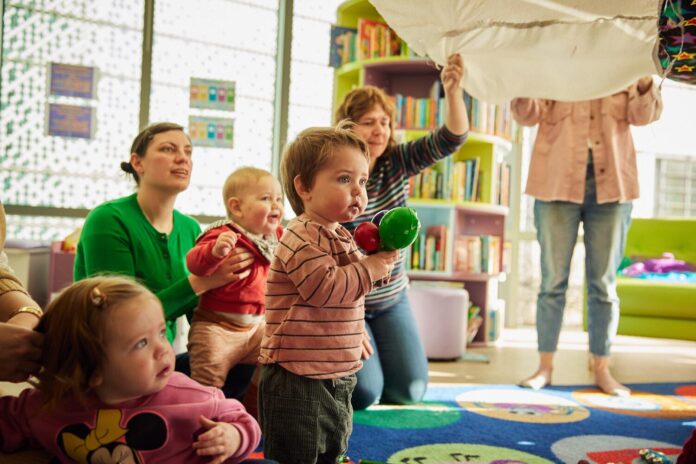
The power of positive parenting, one year on
One year on from the historic law change to end the physical punishment of children, a number of dedicated parenting support packages across Wales are helping to strengthen positive changes to family life and raise awareness of the new legislation.
The new law, which protects children and their rights, came into force in March 2022 and provides children in Wales with the same protection from assault as adults.
Recently published research provides a snapshot of views from early 2022, just before the law came into force. This snapshot shows 71% of parents/carers of children aged seven and under disagreed that it was sometimes necessary to smack a child compared to 63% surveyed in 2021.
The report also found that since 2018 there had been an increase in the level of awareness and support for the law, with 59% of respondents reporting they were in favour of the law change compared to 38% in 2018.
Eligible parents / carers who are found to have broken the law are being given help by parenting professionals as part of an out of court parenting support scheme. The scheme, which is funded by the Welsh Government, helps the parents to avoid reoffending. During the six months following the Act coming into force, there were 55 referrals for out of court parenting support across Wales by the police.
Those working with the parents have hailed the new legislation for the clarity it has provided to the sector and parents on what was previously a grey area regarding the physical punishment of children.
Sue Layton, Chairperson of the National Parenting and Family Support Strategic Leads Network in Wales and Parenting Coordinator for Gwynedd, said,” The new legislation has been invaluable in bringing the impact of physical punishment to the fore and the additional resources provided to local authorities for bespoke parenting support has been welcomed. Lines are not as blurry as before. It’s definite and it’s no longer acceptable to physically punish a child in Wales.”
Gwawr Miller, Parenting Support Officer, Children’s Wales Act, Gwynedd Council, added, “We undertook a considerable amount of awareness raising before the law changed as part of our parenting sessions. This enabled us to bring up the topic of physical punishment and make parents aware the law was changing. Since the law came into force, we have been successful in getting parents to reflect on their own behaviour and getting them to focus on other forms of discipline that doesn’t involve physical punishment.”
Julie Morgan, Deputy Minister for Social Services, said, “Parenting is not always easy and our focus has been and continues to be positive parenting. Our Parenting. Give it time campaign is a great place for parents to start.
“One year on since physical punishment became illegal, I am pleased to see that the support we’re offering to parents is making a real difference. The law was the catalyst the sector needed to be able to provide clarity and practical support and every year that passes more and more children and families will see the benefit of the legislation and the support it has given children’s rights in Wales.”
Parenting professional perspectives
Professionals working in the field of parenting support have hailed the new legislation for the clarity it has provided to the sector and parents on what was previously a grey area regarding the physical punishment of children.
Sue Layton, Chairperson of the National Parenting and Family Support Strategic Leads Network in Wales and Parenting Coordinator for Gwynedd, said, “The new legislation has been invaluable in bringing the impact of physical punishment to the fore and the additional resources provided to local authorities for bespoke parenting support has been welcomed. Lines are not as blurry as before. It’s definite and it’s no longer acceptable to physically punish a child in Wales. Covid was a difficult period for us and parents due to the lack of face-to-face support. A year on we are coming out of that and we are noticing peer support is proving invaluable in terms of sharing experience as well as raising awareness of the law.
“You’ll always have the parent who says it did them no harm and then there will be a parent who says it did harm them and had a big effect on their life. Often that’s enough to plant a seed in a person’s mind that physically punishing a child is not helpful going forward. Listening to the experience of other parents is often much more powerful than anything we say as professionals.”
“I have used reflective letters as part of my support to parents. These are the basis, after each session, for parents to reflect on how far they have come. What’s good about the reflective letters is while we may have discussed and explored many things with parents in our sessions, the letters narrow down the main points. Parents can easily read and recognise the conversations had and work on key points for the next session. Interestingly, the courses have been not only with mothers, but also more fathers than before. It is important both parents get the support. Rather than looking at generic punishment we look in more detail on their own experiences of physical punishment and bring it the forefront of their mind. The law has changed and hitting a child is no longer acceptable, but we need to explore how they were parented to understand how they parent their own children.”
In almost all cases it is a loss of control, the stress level, everything that was going on within the family. A lot of factors are at work, but to reach the point of using physical punishment, more often than not it is parents losing control of a situation. In doing so, it becomes a real knock to their confidence, and they really question their ability to parent. It’s a big thing. We work to build up their confidence and explore how they nurture themselves, so they don’t get to the point where they feel absolutely out of control and resort to physical punishment.”
If parents have not been positively parented themselves and we tell them they can’t use physical means, they often question what they are supposed to do. This is understandable if they don’t have the tools and strategies to cope. It’s a learning curve for some and just having those tools can make all the difference as many lack a physical role model. It’s not that long ago that teachers were using the cane or slipper and many didn’t have a positive role model at school or at home.”
Help keep news FREE for our readers
Supporting your local community newspaper/online news outlet is crucial now more than ever. If you believe in independent journalism, then consider making a valuable contribution by making a one-time or monthly donation. We operate in rural areas where providing unbiased news can be challenging. Read More About Supporting The West Wales Chronicle























